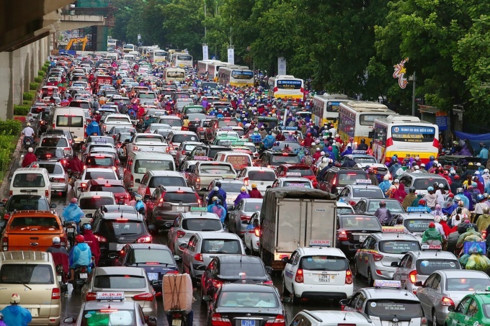New regulation puts the squeeze on Vietnamese car importers
 |
| Long lines of cars on Hanoi roads during rush hour are the new norm in the capital as more people ditch motorbikes for the four wheeler. Photo by VnExpress/Ngoc Thanh |
Nguyen Dinh Thanh, the owner of a car dealership in Hanoi’s Long Bien District, is in danger of going out of business when a new decree regulating automobile imports takes effect next year.
The decree stipulates that traders will only be permitted to import automobiles if they can provide valid vehicle registration certificates issued by authorities from the countries of origin.
Original quality control certificates for each vehicle and letters of authorization regarding recalls of defective vehicles from the manufacturers will also be required, along with copies of quality assurance certificates provided by the countries of origin.
“The requirements are too strict for car dealerships to meet,” Thanh said, worrying that the dealership that has fed his family and dozens of workers over the last 10 years will have to close.
“We will import 40 more units before the decree takes effect (January 1, 2018). When they are sold out, maybe in two months, we will have to shut down the business.”
Thanh is not the only car dealer concerned about the new regulations.
Nguyen Tuan, director of auto dealership Thien Phuc An, said: “It is very difficult to get copies of quality assurance certificates for imported cars from foreign authorities. Only official distributors and subsidiaries of manufacturers in Vietnam can get them.”
“Small traders who import cars through sub-agents or a third country are unable to do this,” he added.
Another requirement that requires enterprises to have one car from each batch of imports technically accredited in Vietnam will cost importers more time and money, he said. “Businesses may have to spend weeks and up to VND100 million (US$4,340) to complete the accreditation procedure.”
Under current regulations, only one certificate is required for each model of car, regardless of how many batches are imported.
Pham Anh Tuan, head of the strategic planning department at Toyota Vietnam, said foreign authorities only provide quality assurance certificates for cars sold in their own countries, not for those that are exported. This is the same in Vietnam.
In some countries, authorities do not issue these certificates at all. In the United States, for example, car manufacturers are responsible for quality control, and government agencies only take over after the assembly line, he said.
Thanh urged the government to change the policy so that car dealerships can survive. He said it would be a waste of money if car dealers had to shut down after making huge investments. Thousands of employees would also lose their jobs, he added.
What the stars mean:
★ Poor ★ ★ Promising ★★★ Good ★★★★ Very good ★★★★★ Exceptional
Latest News
More News
- State corporations poised to drive 2026 growth (February 03, 2026 | 13:58)
- Why high-tech talent will define Vietnam’s growth (February 02, 2026 | 10:47)
- FMCG resilience amid varying storms (February 02, 2026 | 10:00)
- Customs reforms strengthen business confidence, support trade growth (February 01, 2026 | 08:20)
- Vietnam and US to launch sixth trade negotiation round (January 30, 2026 | 15:19)
- Digital publishing emerges as key growth driver in Vietnam (January 30, 2026 | 10:59)
- EVN signs key contract for Tri An hydropower expansion (January 30, 2026 | 10:57)
- Vietnam to lead trade growth in ASEAN (January 29, 2026 | 15:08)
- Carlsberg Vietnam delivers Lunar New Year support in central region (January 28, 2026 | 17:19)
- TikTok penalised $35,000 in Vietnam for consumer protection violations (January 28, 2026 | 17:15)
















 Mobile Version
Mobile Version